- Home
- Leslie Meier
Irish Parade Murder Page 13
Irish Parade Murder Read online
Page 13
As is every young journalist, thought Lucy to herself.
“. . . and I have the puppets. And I do some paintings. Rob and I have similar dreams.” She paused. “Anyway, I told him I’d been having trouble with Gabe McGourt. He kept calling me, pestering me to go out with him, but I always came up with some excuse to say no. I was acquainted with him. I’d chatted with him a couple of times, but I didn’t really like him. There’s no night life in this town except at the roadhouse. I tried going there a couple of times, but as soon as I walked in the door, he’d be all over me.”
Lucy didn’t like the sound of this. “Like physically?”
“He didn’t grab me or anything, but he stuck with me, wouldn’t let me talk to anybody else. So I stopped going for a while, but a couple of weeks ago, I thought I’d give it another try. I thought he might have given up, you know? And that’s the night I met Rob, and we were talking and having a good time when Gabe showed up. He immediately came over and tried to join us, but Rob told him to get lost. That didn’t go over very well, and Gabe was getting sort of aggressive, but Rob and I got out of there before it turned into a fight.”
“I suppose quite a few people witnessed this scene?”
“I’d say most of the twenty- and thirty-something population of the town.” She let out a big breath. “That’s why I wish he’d told the truth.”
“I wouldn’t worry too much,” said Lucy. “Some words in a bar hardly make for a motive.”
“But there might have been more, I don’t know. What I do know is that Gabe could be real obnoxious, and he might have kept after Rob.” She picked up the banshee head and stood up. “I’ve got to get his thing dressed; some high school girls are coming by after school to help me finish up the banshees, and I want to have a finished one to show them.”
“Thanks for telling me all this,” said Lucy, also rising from her chair. “Maybe I can convince Rob to revise his statement. I know one of the state police detectives pretty well, and I think he’d understand.”
“That’s a good idea, Lucy. I hope he decides to tell the truth before the cops find out for themselves.” She bit her lip. “Rob’s a good guy. He would never intentionally hurt someone, and I can’t believe he would ever do something as nasty as sabotaging someone’s truck.”
Lucy was stunned. “Do you think that’s what happened? That somebody intended for Gabe to die?”
“It wouldn’t surprise me,” admitted Rosie. “And if the cops are asking questions, I’d guess they think that’s what happened.”
Lucy didn’t want to go there. “I know how they work,” she insisted. “I think they’re just doing due diligence so they can close the case.”
Rosie was bent over, taking an old sheet out of the large tote bag she’d brought with her. “I hope you’re right,” she said, cutting through the hem with a pair of scissors she’d also brought. Then she took hold of the sheet on either side of the cut and pulled, making a ripping sound.
Lucy left her to her work, reducing the sheet to long strips of white cloth, and began making her way slowly through the big hall, exchanging smiles and greetings with the people she knew, which was most everyone. She was chatting with Pam Stillings, her friend and her boss, Ted’s, wife, when she noticed the county health agent, Terry McLaren, coming through the door. “Oh, gosh,” said Pam. “Here comes trouble, and since I’m the only outreach committee member here, I’m afraid I’m the one who has to deal with it.”
Pam hurried to greet Terry, who was a middle-aged woman with very short gray hair. She was wearing a bright blue windbreaker issued by the county, which had her name and job embroidered over her left breast. On the back, HEALTH AGENT was written in big block letters.
As Lucy watched, Pam shook hands with Terry, and the two made their way to the kitchen area. Lucy decided to follow, wondering what was going on, and watched as Pam showed Terry the permit for food service that was tacked to a bulletin board.
“That’s for the church,” said Terry, pointing to the line where the permit holder was identified.
“Well, this is the very same church,” said Pam.
“I know, but the church isn’t sponsoring the festival; that’s a separate group.”
“The vestry voted to accommodate the festival,” said Pam, “so I guess we’re sponsors.”
“No.” Terry shook her head and opened a plastic folder, producing a printed sheet of regulations and giving it to Pam. “The church is only providing the venue; the festival is actually sponsored by the Gilead Community Action Committee, and that group needs to apply for a food-service permit, which they have failed to do.” She glanced at the small group of bakers who had gathered at the opposite end of the kitchen island. “I may have to shut this down.”
“Oh, please, no,” said Lydia Volpe, known far and wide for her pizzelle cookies, which were always the first to be snapped up at any bake sale. “We’ve all worked so hard.”
“Wouldn’t you like some raffle tickets?” offered one of the volunteers, displaying a roll of numbered tickets and pulling off a long strip. “They’re going to be five for two dollars, but these will be complimentary for you,” she said, in a misguided attempt at bribing a public official.
“Uh, no, thank you,” said Terry, in an affronted manner. “I’ll give the GCAC twenty-four hours to get the food-service permit. No permit, no food service. Understand?”
“Yes.” Pam nodded. “I’ll call Brendan right away, I’m sure he’ll get right on it.”
“Good.” Terry looked around the room. “So the festival is going to take place here, in this hall?”
“Not the entire festival,” explained Pam. “Mostly we’re using it for prep. A lot of the festival events will take place outside: the noise parade, musical performances, fireworks, things like that.”
Terry pounced, reminding Lucy of a cat going after a mouse. “Fireworks?”
Pam knew she was in trouble. “I believe I heard something about fireworks.” Like the mouse, she tried to evade the cat. “But I’m not sure.”
Terry licked her lips. “If there are fireworks, the GCAC will need a special permit from the county fire marshal.”
“I’ll be sure to pass that information along to Brendan,” said Pam, sensing the possibility of escape.
Terry bared her pointy teeth in something like a smile. “Unfortunately, permits for fireworks require an appointment with the fire marshal, and I’m afraid he’s booked solid for the next few weeks.” She again opened the plastic folder and produced yet another sheet of regulations, then shut the stiff folder with a snap. “Have a nice day,” she said, then turned and marched off toward the door.
“My goodness,” fumed Lydia. “That was quite a performance.”
“Well,” offered Lucy, “if you ever wondered what county government actually does, now we know.”
“They’re just a bunch of party poopers,” exclaimed Pam, grabbing her phone and calling Brendan.
Rachel, who’d been observing the scene, joined the group of distressed women. “What’s going on?” she asked.
Lucy explained the situation while Pam left a message for Brendan to call her immediately.
Rachel was immediately suspicious of the health agent’s motives. “This all sounds pretty fishy to me. I bet the sheriff made her do it.”
“I think so, too, but what can we do?” asked Pam.
“I’m not sure, but there must be something,” insisted Rachel. “I’ll call Bob and ask him to look into it. Maybe it’s harassment, or a civil rights violation.”
Lucy had a high regard for Rachel’s husband, Bob Goodman, who was a lawyer, but she doubted there was anything he could do. She suspected the sheriff was a master at manipulating the town’s various rules and regulations for his own advantage, sometimes overlooking the fine points of the law and deciding at other times to enforce them. Sometimes, as when he informed Rosie she’d missed the deadline for applying to march in the parade, he made them up. That was how he maintain
ed his power, and she was convinced he’d go to any lengths to keep it.
Chapter Twelve
Lucy was thinking about the sheriff as she drove home, and trying to come up with a way to expose and break his hold on the county, when she got a call on her cell from Edna. Her mother-in-law rarely phoned, so her first thought was that Edna must be in some sort of trouble. “Hi, what’s up?” she asked, bracing herself for a crisis.
Edna was slow to answer, and when she did, she sounded unsure of herself. “Um, well, I—I thought I’d take you up on your invitation for a visit—if it’s still good, that is.”
Somewhat relieved, Lucy was quick to reply. “Of course, it’s still good. We’d love to have you come, and stay for as long as you want.”
“Well, I don’t want to be a burden . . .”
“Don’t be silly. We’ve got plenty of room, and it will be a pleasure to have you—the girls were saying the other day how much they love your blueberry muffins, and I’ve still got plenty of those blueberries we picked last summer in the freezer. When can you come?”
“I’m not sure. I’ve been talking to Kate, you see, and it depends on when she can make the trip.”
Hearing this, Lucy had a feeling that this conversation would demand her entire attention, so she pulled off the road into the parking area by the hospital thrift shop, just outside of town. “Were you thinking that Kate would stay here, too?” she asked, unwilling to entertain an uninvited guest.
“Oh, no. I never thought of such a thing,” insisted Edna. “Kate has some business she needs to attend to in Portland, and since she knows that you all live in Maine, she suggested it might be a good time for us all to finally get together as a family.”
“Are you sure that’s a good idea?” asked Lucy, not at all sure she was ready to play happy families with Catherine Klein.
“Well, yes, Lucy. She’s family, after all, and, wouldn’t you know, I don’t remember her at all from the funeral. I have no idea what she looks like.” Her voice softened. “Does she resemble my Bill? You met her, didn’t you? Did you think she looked like him?”
Lucy was floored. “You know, Edna, that was the farthest thing from my mind. She’s nice enough looking, but I can’t say I saw any family resemblance.”
“Of course, you wouldn’t have been looking for it, I suppose,” said Edna, sounding disappointed. “Not unless the resemblance was very strong and striking.”
“Well, it definitely wasn’t,” said Lucy, her suspicions about Kate Klein’s motives growing. “Has this Kate been calling you a lot? Or emailing?”
“Oh, no. Not a lot. But she does check in with me every so often; she says she just wants to make sure that I’m doing okay.” She paused. “I have to admit, I do enjoy talking with her. She always wants to know about my Bill—well, it’s only natural since he’s her father.” Hearing Lucy’s sharp intake of breath, Edna continued in a rather more assertive tone. “Well, I know that you and Bill aren’t convinced; you think it’s not definite or something. But they say DNA doesn’t lie, and I have to say Kate is very interested in learning about her father, and I enjoy talking about him, sharing my memories.”
Lucy knew the discomfort she was feeling was rooted in guilt. Why hadn’t she and Bill been better about keeping in touch with Edna? They’d taken her at her word that she was doing fine and, relieved, had gone about their own business. They’d conveniently ignored the fact that she was really coping with terrible grief, and they should have been more caring and supportive. They’d left the door wide open for this Kate woman to insinuate herself with Edna, taking advantage of her loneliness and filling the enormous void left by her husband’s death.
“We’re looking forward to sharing those memories with you, too,” said Lucy. “We have videos and photo albums, if it’s not too soon . . .”
“I’d love to see them,” said Edna. “And so would Kate.”
I’m sure she would, thought Lucy, stifling the urge to bad-mouth Kate and focusing instead on the details of the visit. “Do you have any idea when you might come?”
“Now that I’ve spoken with you, I’ll check with Kate, and we’ll pick a date. How does that sound?”
“Absolutely fine,” said Lucy, uncomfortably aware that Kate was now a force to be reckoned with and had a great deal of influence over Edna. “You’re always welcome, you know.” She paused. “By the way, have you found the missing will?” The devil seized her tongue, and she asked the question that had been lurking in the dark recesses of her mind. “Has Kate been asking you about it?”
“Oh, yes. She’s been very helpful; she’s offered a lot of ideas for places to look.” Edna sighed. “I tell you, I’ve turned this house upside down, but I haven’t found it. I’m afraid I’m going to have to do something pretty soon so I can access Bill’s accounts, but I’ve been putting it off.”
Lucy didn’t like the sound of this at all, but didn’t want to worry Edna. “We’ll look here, too,” said Lucy. “I’m sure it will turn up.”
“That’s what Kate says. She’s convinced it will turn up,” offered Edna. “I can’t wait for us all to meet her.”
“Me, too,” said Lucy, hoping she didn’t sound as insincere as she felt.
It was with some relief that she spotted Bill’s truck in the driveway when she got home. He was in the kitchen, seated at the round golden-oak table and looking through the mail with a can of beer at hand.
“Oh, boy, we’ve got trouble” was Lucy’s greeting, as she dropped her bag on the table by the door and went straight to the fridge to pour herself a glass of wine.
“Nice to see you, too,” said Bill.
“I’m sorry, I shouldn’t dump this on you the minute I walk through the door, but I’m so upset . . .”
He faced her, furrowing his brows in concern. “What’s the matter?”
“It’s your mom. She called to say she’s coming for a visit.” Lucy sat down and took a big swallow of chardonnay.
Bill was puzzled. “Is that a problem? It’s never been a problem before.”
“No, not her visit. I’m glad she’s coming. But that Kate Klein woman is tagging along . . .”
Now Bill was alarmed. “Coming here?”
“Not to our house, but your mom is timing her trip to coincide with this Klein woman’s itinerary so we can all meet and get to know each other.” Lucy was watching Bill closely to see his reaction, and so far, it didn’t seem good. “She sounded as if she already believes that this Klein woman is really your dad’s child, and . . . ?
Bill’s face was stony. “And what?”
“And she’s been helping your mother look for the missing will.”
“Crap.” He bit his lip and ran his finger around the rim of his beer. “She’s really after money; she’s working a con, and my mom is falling for it.”
“I think so,” said Lucy. She took another healthy swallow of wine. “Your mother said that DNA doesn’t lie; she’s really convinced that Kate is your father’s child.”
“Well, maybe that’s true, about DNA. But people do lie, and I imagine a clever person could produce a pretty convincing and entirely fake Genious report. The question is, what do we do about it? Without the will, we’re sunk.”
“We have to discredit her, expose her.”
“Easier said than done.”
“And it’ll kill mom, if she’s really swallowed this woman’s line.”
“I know,” agreed Lucy, staring at her glass and wondering why it was now nearly empty.
* * *
The weekend passed quickly, filled with the usual chores, which this week included clearing out the guest room and making it ready for Edna. The last occupant had been Lucy and Bill’s grandson, Patrick, and Lucy had decorated it with superhero-themed linens for his visit. She wanted Edna to feel special, so she stripped away the superheros, including Bill’s prized vintage Batman poster, and made the bed with rose-patterned sheets and coverlet. She replaced Batman with a framed Monet print and got b
usy emptying the bookshelf and dresser drawers. As she worked, she kept an eye out for anything remotely resembling a will, on the off chance Bill Sr. had left it there during a visit, but there was nothing except the usual clutter that tends to accumulate in any empty space. She lined the dresser drawers with pretty floral wrapping paper and filled the bookshelf with a selection of light reading: travelogs, cozy mysteries, and historical fiction. She transferred the out-of-season clothes to other closets, and she added a half-dozen padded hangers to the white plastic ones that remained on the empty pole.
As she closed the door, she glanced across the hall to her newly renovated master bedroom, which now included an en suite bath, and smiled. It would be so much pleasanter for everyone now that she and Bill had their own bath and didn’t have to compete with Edna and the girls for private time in the old family bathroom.
By the time Monday morning rolled around, Lucy was satisfied that everything was ready for Edna’s visit, whenever she decided to come. She’d even placed an empty water glass and vase on the nightstand, ready to be filled when the time came, along with a couple of current magazines.
She was thinking what else she might do—perhaps adding a small box of chocolates would be a nice touch, or a tin of cookies, homemade cookies like lemon crisps—as she fought the brisk March wind and arrived at the office. The little bell on the door seemed to jingle-jangle quite cheerily today, she thought, and she greeted Phyllis with a bright smile.
“February’s over,” she declared, “and March is blowing in like a lion.”
Phyllis, however, did not react as expected. Instead of laughing at Lucy’s nonsense, she frowned and shook her head. Her hair, Lucy noticed, was dyed green in honor of St. Patrick’s Day. “Not a good morning.”
Lucy was immediately concerned, noticing Phyllis’s weepy eyes and trembling lips, and feared something terrible must have happened to Phyllis’s husband, Wilf, or some other member of her family. Maybe her niece, Elfrida, or one of her kids. “What happened?”

 Christmas Card Murder
Christmas Card Murder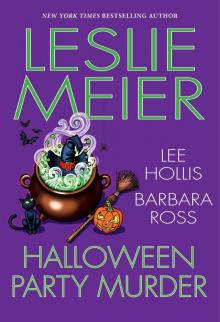 Halloween Party Murder
Halloween Party Murder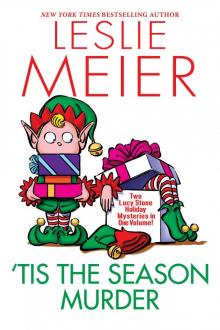 'Tis the Season Murder
'Tis the Season Murder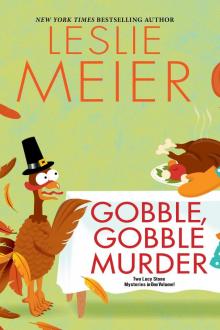 Gobble, Gobble Murder
Gobble, Gobble Murder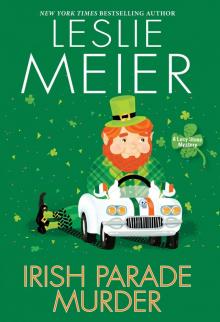 Irish Parade Murder
Irish Parade Murder Bake Sale Murder
Bake Sale Murder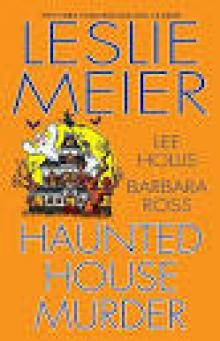 Haunted House Murder
Haunted House Murder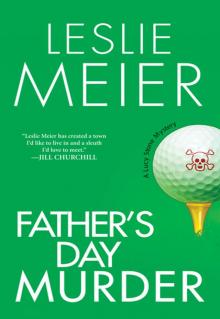 Father’s Day Murder
Father’s Day Murder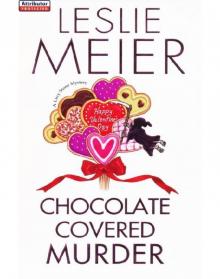 Chocolate Covered Murder
Chocolate Covered Murder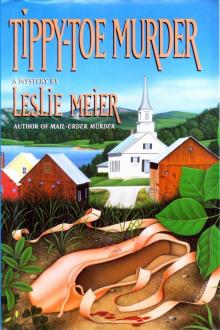 Tippy Toe Murder
Tippy Toe Murder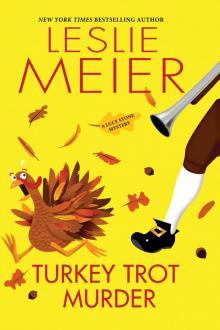 Turkey Trot Murder
Turkey Trot Murder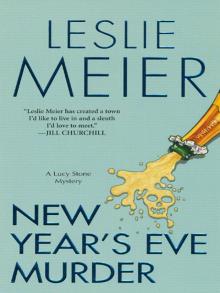 New Year's Eve Murder
New Year's Eve Murder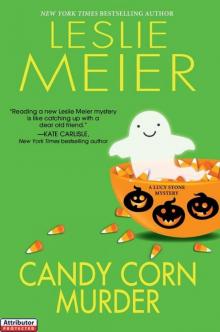 Candy Corn Murder
Candy Corn Murder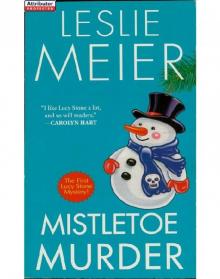 Mistletoe Murder
Mistletoe Murder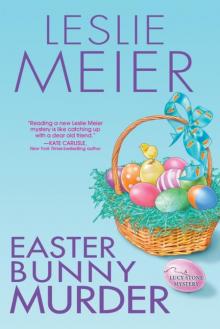 LStone 20 - Easter Bunny Murder
LStone 20 - Easter Bunny Murder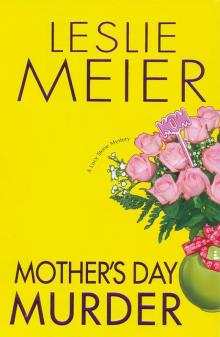 Mother's Day Murder
Mother's Day Murder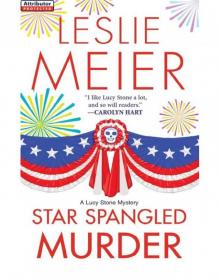 Star Spangled Murder
Star Spangled Murder Silver Anniversary Murder
Silver Anniversary Murder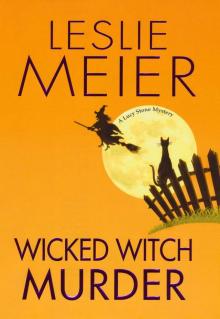 Wicked Witch Murder
Wicked Witch Murder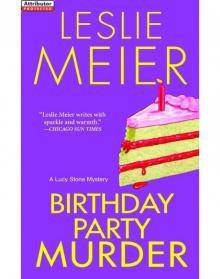 Birthday Party Murder
Birthday Party Murder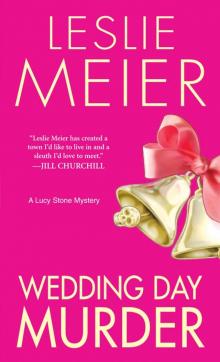 Wedding Day Murder
Wedding Day Murder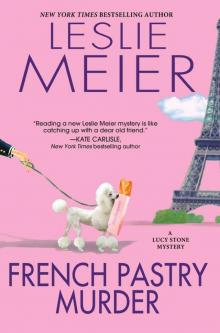 French Pastry Murder
French Pastry Murder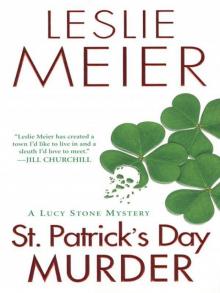 St. Patrick's Day Murder
St. Patrick's Day Murder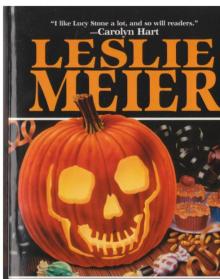 Trick or Treat Murder
Trick or Treat Murder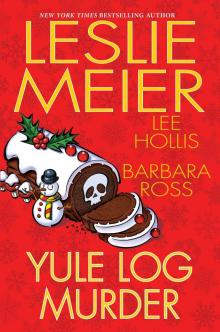 Yule Log Murder
Yule Log Murder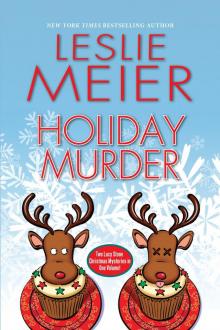 Holiday Murder
Holiday Murder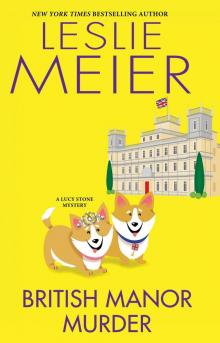 British Manor Murder
British Manor Murder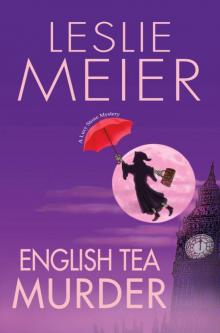 English Tea Murder
English Tea Murder